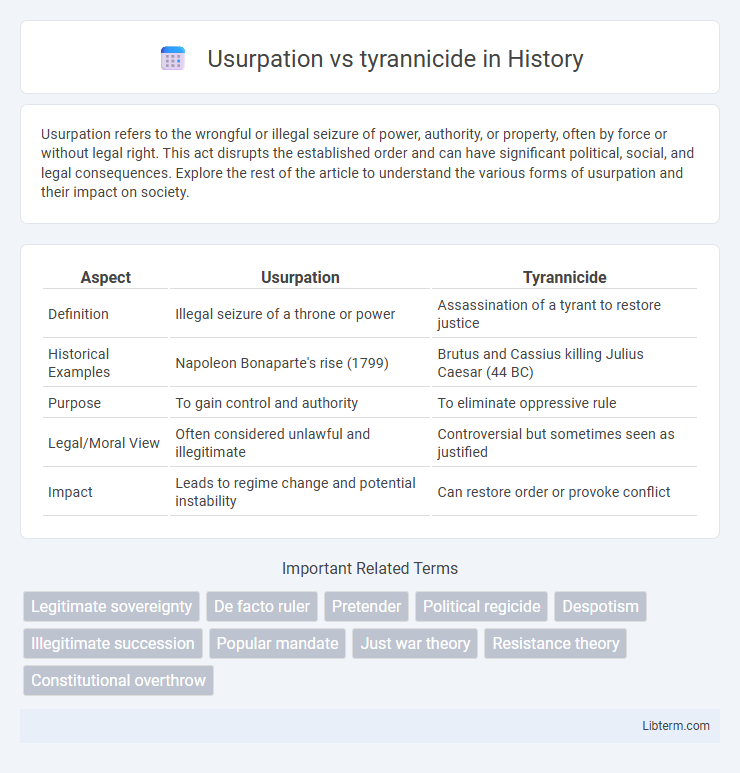Usurpation refers to the wrongful or illegal seizure of power, authority, or property, often by force or without legal right. This act disrupts the established order and can have significant political, social, and legal consequences. Explore the rest of the article to understand the various forms of usurpation and their impact on society.
Table of Comparison
| Aspect | Usurpation | Tyrannicide |
|---|---|---|
| Definition | Illegal seizure of a throne or power | Assassination of a tyrant to restore justice |
| Historical Examples | Napoleon Bonaparte's rise (1799) | Brutus and Cassius killing Julius Caesar (44 BC) |
| Purpose | To gain control and authority | To eliminate oppressive rule |
| Legal/Moral View | Often considered unlawful and illegitimate | Controversial but sometimes seen as justified |
| Impact | Leads to regime change and potential instability | Can restore order or provoke conflict |
Defining Usurpation: Legal and Historical Perspectives
Usurpation refers to the illegal seizure and exercise of power or authority, often bypassing established legal frameworks and hereditary rights. Historically, usurpation has been viewed as an unlawful act that disrupts legitimate governance, prompting legal debates on the legitimacy of rulers who come to power through such means. From a legal standpoint, usurpation challenges the sovereignty of rightful rulers, leading to conflicts over the recognition and stability of political authority.
Understanding Tyrannicide: Ethics and Context
Tyrannicide involves the deliberate killing of a tyrant, justified by the ethical belief that removing oppressive rulers restores justice and protects citizens' rights. It contrasts with usurpation, which often denotes the illegal seizure of power without ethical justification or popular support. Understanding tyrannicide requires examining historical contexts where political legitimacy, moral philosophy, and societal welfare intersect to justify extreme measures against despots.
Historical Cases of Usurpation
Historical cases of usurpation often involve individuals seizing power without legal or hereditary right, such as Julius Caesar's rise culminating in the end of the Roman Republic. Usurpers like Napoleon Bonaparte capitalized on political instability to establish authoritarian regimes, disrupting established succession norms. These acts contrast with tyrannicide, which entails the targeted killing of a tyrant to restore lawful governance, highlighting differing motivations and consequences in political power struggles.
Notable Examples of Tyrannicide
Notable examples of tyrannicide include the assassination of Julius Caesar by Brutus and his co-conspirators in 44 BCE, a pivotal act aimed at ending Caesar's perceived dictatorship. Another significant case is the killing of King Charles I of England in 1649, which symbolized resistance against absolutist monarchy and led to the temporary establishment of a republic. The assassination of Nicolae Ceausescu in 1989 marked a definitive tyrannicide, ending decades of oppressive rule in Romania during the collapse of communist regimes in Eastern Europe.
Political Motivations Behind Usurpation
Usurpation involves seizing power through illegitimate means, often driven by political motivations such as ambition, consolidation of authority, and the desire to control state resources. Unlike tyrannicide, which targets a ruler viewed as oppressive to restore justice or protect political freedom, usurpation prioritizes personal or factional gain over popular welfare. Historical instances reveal that usurpation frequently stems from internal power struggles and opportunistic exploitation of political instability.
Moral Justifications for Tyrannicide
Tyrannicide, the act of killing a tyrant, is often morally justified through the framework of restoring justice and protecting the common good against oppressive rulers who illegitimately usurp power. Philosophers such as John Locke and Cicero argue that tyrannicide is a legitimate resistance to tyranny, grounded in natural law and the right of the people to overthrow a despotic leader. In contrast to mere usurpation, tyrannicide is viewed as a moral imperative when legal and peaceful means of redress have been exhausted and the tyrant's rule causes severe injustice or harm.
Usurpation vs Tyrannicide: Key Differences
Usurpation refers to the illegal or forceful seizure of power or authority from a legitimate ruler, often leading to the establishment of an unauthorized regime. Tyrannicide specifically denotes the act of killing a tyrant--an oppressive ruler--to restore justice or political freedom, often viewed as a moral or revolutionary act. The key difference lies in that usurpation involves seizing control, whereas tyrannicide involves the elimination of the tyrant, frequently with the aim of ending oppression.
Societal Impacts: Revolution or Chaos?
Usurpation, characterized by the unlawful seizure of power, often triggers societal instability and prolonged unrest as established institutions resist illegitimate authority. Tyrannicide, the targeted killing of a despotic ruler, can catalyze revolutionary movements by symbolizing the overthrow of oppression and inspiring collective liberation efforts. Both actions profoundly impact social order, with usurpation risking sustained chaos and tyrannicide offering a potential, though unpredictable, pathway to systemic change.
Usurpation and Tyrannicide in Modern Discourse
Usurpation refers to the illegal or unjust seizure of power, often discussed in modern political theory as a violation of legitimate authority and democratic principles. Tyrannicide involves the act of killing a tyrant, framed in contemporary discourse as a controversial but sometimes justified resistance to oppressive governance. Debates around usurpation and tyrannicide highlight the tension between legal sovereignty and moral legitimacy in modern political movements and revolutionary contexts.
Legal Ramifications and International Views
Usurpation involves the unlawful seizure of power without legitimate authority, often resulting in domestic legal consequences such as criminal charges or loss of political legitimacy, whereas tyrannicide--the killing of a tyrant--is controversial and may be treated differently under national laws, sometimes justified under principles of self-defense or revolutionary acts. International law generally condemns both acts when they violate sovereignty or international peace, but some doctrines permit tyrannicide in extreme cases of gross human rights violations, reflecting divergent views among states and legal scholars. The complexities in distinguishing lawful resistance from illegal usurpation highlight ongoing debates in international jurisprudence regarding sovereignty, human rights, and the legitimacy of political violence.
Usurpation Infographic

 libterm.com
libterm.com